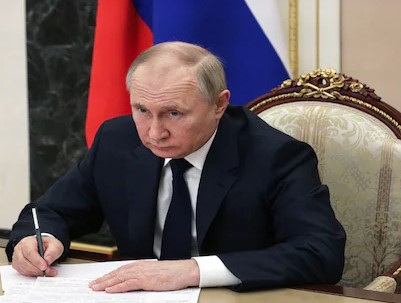Russia’s government recently took firm action in response to measures Australia and New Zealand have imposed since the start of the conflict in Ukraine. By sanctioning 131 Australians and nine New Zealand officials, Russia is signaling a strong reaction to what it calls anti-Russian stances from these countries. This latest round of sanctions, issued by Russia’s Foreign Ministry, highlights the ongoing global tensions and complex web of restrictions that have emerged since Russia’s invasion of Ukraine in February 2022. Here, we’ll take a look at the details surrounding these sanctions, the targeted groups, and the broader impact of this war on international relations.
Why Russia Has Sanctioned Australian Citizens
In response to previous actions taken by Australia, Russia’s Foreign Ministry announced new sanctions, effectively banning 131 Australians from entering Russian soil. These measures follow Australia’s own sanctions on over 1,000 Russian citizens and companies since the beginning of the Ukraine war. The individuals named in Russia’s sanctions list are primarily Australians connected to the defense industry, journalists, and public figures who Russia believes have promoted an anti-Russian agenda.
This “anti-Russian agenda” as described by Russia’s Foreign Ministry reflects the Australian government’s support for Ukraine. Australia has joined other Western nations in standing with Ukraine, providing humanitarian and economic support, and supporting military aid for the country. As a consequence, Russia is now blocking Australians who it sees as connected to Ukraine’s defense efforts. Among the sanctioned individuals are Australians working at companies like Electro Optic Systems and Micro-X, which operate in defense technologies. Also included is the co-head of a Ukrainian support organization in Australia, reflecting Russia’s position on those it perceives as opposing its interests.
Sanctions on New Zealand Officials
Russia’s sanctions didn’t stop with Australia. Nine New Zealand officials have also been barred from entering Russia. The individuals targeted in New Zealand primarily come from its Ministry of Defense, including three deputy ministers. This step taken by Russia aligns with its broader response to countries that have spoken against its military actions in Ukraine. Similar to Australia, New Zealand has backed Ukraine in the conflict, and these sanctions likely represent Russia’s dissatisfaction with the support shown by New Zealand to the Ukrainian government.
New Zealand, like Australia, has imposed its own sanctions on Russia since the beginning of the conflict. The targeted sanctions from New Zealand have affected Russian entities and high-profile individuals, and this approach has caused diplomatic tensions to rise between Russia and both countries in recent years. With these latest sanctions, Russia’s Foreign Ministry appears to be responding to what it sees as a hostile stance from New Zealand in the ongoing crisis. Although the impact of these sanctions on New Zealand’s defense officials may be limited in practice, they add to a long list of restrictive measures shaping relations between Russia, New Zealand, and Australians who have opposed Russian policies.
Global Sanctions and the Impact of the Ukraine War
Since the war’s start on February 24, 2022, the global landscape has changed significantly due to the sanctions imposed on Russia. The conflict began when Russia, under the orders of President Vladimir Putin, invaded Ukraine with the stated goal of demilitarizing the country and protecting Russian-speaking populations in the eastern regions. Putin calls the invasion a “special military operation” but has faced strong condemnation from Western nations, who view it as a war of aggression.
In response to the invasion, Australia, New Zealand, and many other countries have enacted sanctions aimed at isolating Russia economically and diplomatically. These sanctions have impacted various sectors of Russia’s economy, affecting trade, technology, defense, and finance. For example, Western sanctions have restricted Russian banks from accessing global financial systems, and Russian airlines are banned from numerous international airspaces. Many multinational companies have also suspended or terminated their operations in Russia. The country’s economy, heavily dependent on exports of oil, gas, and other natural resources, has faced challenges as it grapples with the extensive limitations imposed by these sanctions, directly impacting Australians who work in industries affected by these global shifts.
At the same time, the human toll of the war is enormous. Thousands of lives have been lost in the conflict, and millions of people have been forced to flee their homes, creating one of the largest displacement crises in recent history. The war has also placed a strain on global food supplies, as Ukraine, a significant exporter of wheat and other crops, has faced severe disruptions in its agricultural sector. Additionally, many countries that rely on Russian energy resources have scrambled to find alternative sources to reduce their dependency, further complicating international relations and global economic stability, a ripple effect seen by Australians and others around the world.
This cycle of sanctions and counter-sanctions underscores the increasingly strained relations between Russia and Western-aligned countries like Australia and New Zealand. For every action taken by one side, a countermeasure follows, creating a tense and complex international landscape. While diplomatic channels are still open in some respects, the ongoing sanctions reveal the depth of the disagreement between Russia and the broader Western world regarding the Ukraine conflict and the stance taken by countries such as Australia and New Zealand. Australians and New Zealanders alike remain impacted by the diplomatic and economic shifts caused by these continued sanctions and rising tensions.
As global attention remains fixed on Ukraine, the sanctions imposed by Russia on Australia and New Zealand serve as a stark reminder of the conflict’s far-reaching effects. From defense industries to government officials, these restrictions are impacting a broad range of sectors and individuals, underscoring the continued high stakes in this conflict. The Ukraine war’s effects go beyond the battlefield, reshaping alliances and influencing the political landscape across continents as Australians, New Zealanders, and others navigate an increasingly polarized world stage.


